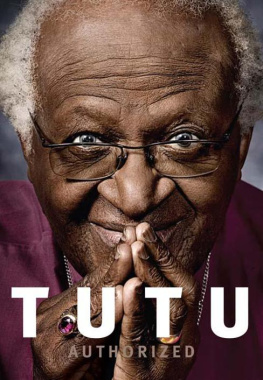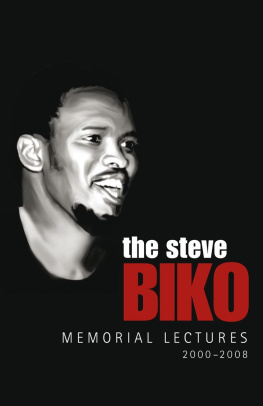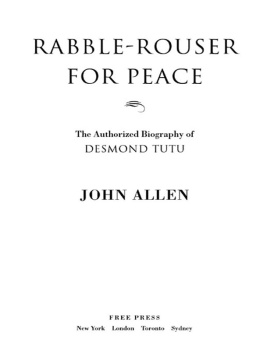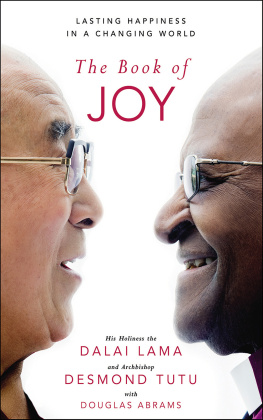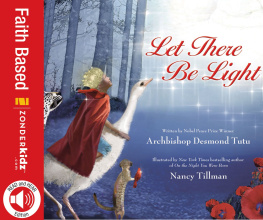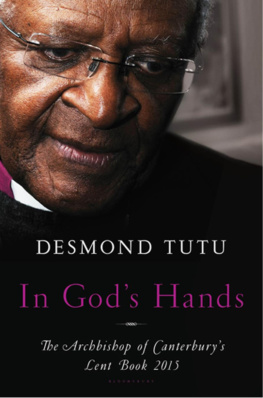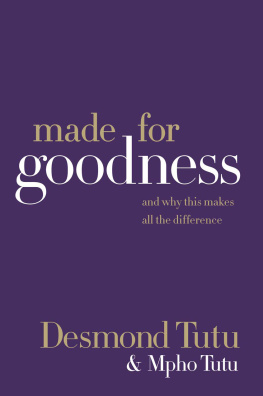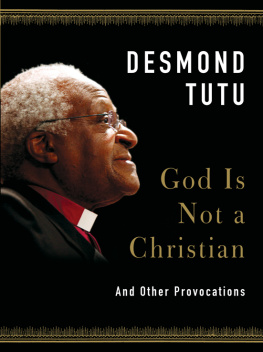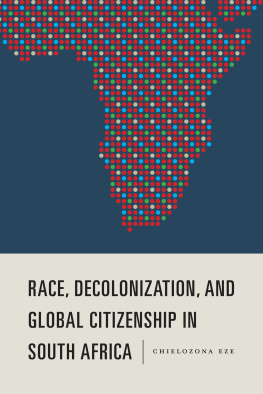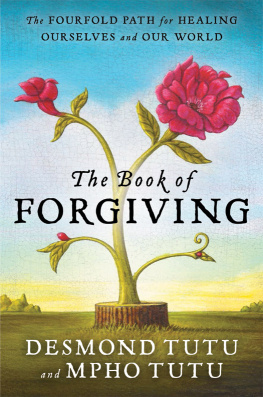TUTU
AUTHORIZED
ALLISTER SPARKS & MPHO TUTU
FOREWORD BY BONO
INTRODUCTION BY HIS HOLINESS THE FOURTEENTH DALAI LAMA

CONTENTS
E verybody is trying to figure out their way in the world, their way through the world. How do you carry yourself? How can you be humble, yet not get walked upon? How do you hold your head up but not be fearful? For most its not easyfor me its impossible. And in my struggle to sort it out, Archbishop Desmond Tututhe Archhas been a role model like no other.
His leadership, his bravery, and the change he has brought to the world mark him out as extraordinary. Quite unlike the rest of us. But when you meet him, what strikes you is his very humanness, his humor, his humility. All echoes of the Latin humus earth that has reached its natural settling point. Earthiness, combined with elevation: thats some dance to pull off. To be that serious and that silly. To carry the weight of injustice, yet remain so light on his feet. To have so much faith and so little religiosity.
Surely laughter is the evidence of freedom. When the archbishop laughs, you hear and you feel his freedom. For me, hes not just a graceful man but the embodiment of this most radical and transformative of wordsgracea quality impossible to define and difficult to evoke, but we know it when we see it, and we see it in him.
All this makes me quite willing to do whatever he tells me to do; he leaves me no other choice. The last time I was slow responding to his request I was told in an e-mail that I would not be let into heaven. The Arch plays hardball and has the Lord on his side. No wonder I consider him my boss. People ask how I got so involved in the fight against extreme poverty and why my singing voice has sometimes turned into town crier. Well, it would be nice to say that I work on behalf of the voiceless, poor, and vulnerable but, actually, I do this because the Arch asked me to. He was my wake-up callmine and many others. Not the shrill, ear-splitting sound of a fire alarm, but more like a church bell ringing out: a clear, beautiful note that hangs in the air and resonates in your bones.
Wake up to what, exactly? Wake up to what the world can be. A world truly at peace. And peace, from the Archs point of view, is not the absence of war. What he seeks is a shift in the battlegroundforsaking armed conflict for the longer and more ennobling struggle against complacency, against selfishness, against revenge, and other, darker aspects of human nature. To follow him in this fight is to have your life turned upside down turning the world right side up. To follow him is to join that ongoing march, the journey of equality.
BONO
I remember first meeting Archbishop Desmond Tutu over two decades ago. Since then, the better I have got to know him, the greater has been my respect for him as a sincere spiritual practitioner, one who sets great store by the power of faith. There is a remarkable, frank, and mutual respect between us.
I have immense admiration for the great work he and Nelson Mandela accomplished with the Truth and Reconciliation Commission. The genuine reconciliation they achieved not only allowed South Africa to make a new start less burdened by the past than it might have been, but also served as a tremendous model for other communities emerging from extended periods of conflict. It was likewise the archbishops important suggestion that spiritual leaders should visit places of conflict together to offer good counsel.
As a spiritual leader and a freedom fighter committed to nonviolence his achievements have been wonderful. Archbishop Tutus sharp and piercing eyes reflect his realistic assessment and astute judgment whatever the situation, but Ive also noticed that his nature is gently teasing. His easygoing joviality brings a pleasant atmosphere to any meeting he attends, no matter how serious the matter under discussion.
His commitment to reconciliation, not simply as a spiritual ideal but in actual practice, has been exemplary. I can only hope that, when the time comes, I too can show as much commitment and strength. When we first met, Archbishop Tutu was not much interested in the cause of Tibet, but he has since become one of our staunch supporters, for which I am grateful. He is a man of principle who has spoken up on the Tibetan peoples behalf even when it meant criticizing his own government. China often likes to suggest that it is only white Americans and Europeans who criticize it for its conduct in Tibet. I cannot emphasize enough the impact of such criticism when it comes from a distinguished black African of his stature. In a similar vein, he and Vclav Havel recently wrote a ringing defense of the imprisoned Chinese human rights activist and fellow Nobel laureate, Liu Xiaobo.
It gives me great pleasure to know that Archbishop Tutus daughter, the Reverend Mpho A. Tutu, a warm and beautiful person like her father, has compiled this affectionate portrait of him. It is a fitting tribute to a great man.
HIS HOLINESS THE FOURTEENTH DALAI LAMA

Tutu speaks at a mass funeral in KwaThema township, near Johannesburg, July 1985. He condemns the practice of necklacing, a horrific method of killing suspected informers in which a tire filled with petrol is placed around the victims neck and set afire.
S outh Africa has a way of producing exceptional individuals. It is no small miracle that in the space of a single century it has produced three such figures, in Mohandas Gandhi, Nelson Mandela, and Desmond Tutu: men assured of immortality in the history of humankinds long and still-unfinished struggle to free the wretched of the earth from the bondage of colonialism, racism, poverty, and prejudice.
It is, of course, the moral challenge presented by a culturally and racially diverse society that has been at war with itself over all those issues, more intensely than almost any other, that has fired the furnace that forged these remarkable individuals. For if you are imbued with what Hannah Arendt called the passion of compassion, you cannot remain neutral in a moral crisisand these three exceptional individuals were certainly transfused with that passion. Nor is it misappropriation to claim Gandhi for South Africa, for it was his struggle for human rights during the twenty-one years he spent in South Africa as a young lawyer that forged him into the iconic figure he became back home in India. It was here that Gandhi developed the philosophy of satyagraha (nonviolent resistance), which he used so effectively on his return. As a senior Indian diplomat once put it during an official visit to South Africa: We sent you Mohandas Gandhi, and you sent us back the mahatmathe special honorific he was given meaning great soul.
Tutu will no doubt disclaim any such bracketing of himself with the likes of Gandhi and Mandela, for he has always insisted he was neither a politician nor a leader of the black struggle in South Africa. Our real leaders, he would say repeatedly in those dark days, are in prison and in exile. The government must release them and bring them home to negotiate a new constitution. His own role, as he saw it, was to fulfill the mandate vested in him as a pastor of the Christian Church, to combat the evil of apartheid and follow Gods intention that his people should be led out of bondage into full liberation.
The truth, though, is that Tutu was in fact an interim leader of special importance, for he filled the void caused by the absence of those in prison and exile or otherwise legally silenced at a time when South Africa was under the rule of its two most tyrannical leaders: Balthazar Johannes Vorster from the mid-1960s to the late 1970s and Pieter Willem Bothabetter known by his initials, P. W., or his Afrikaans nickname, die Groot Krokodil (the Great Crocodile)in the 1980s. Tutu was pitched into that tough role when he returned to South Africa in 1975 as dean of St. Marys Cathedral in Johannesburg, after serving on the staff of the World Council of Churches in Britain. Young black South Africans in particular were in a state of high tension at the time and, within a year of Tutus return, were to erupt into a nationwide revolt when the apartheid regime ordered that all black schools had to use Afrikaans as a parallel medium of instruction with English. The students objected: few could speak Afrikaans, but their primary objection was that they saw it as the language of the oppressor. The majority of the white-minority population were the Dutch-descended Afrikaners whose ethno-nationalist movement dominated the government that was imposing the apartheid policy.

